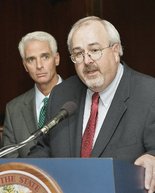In his eight years as Florida's top emergency manager, Craig Fugate, now the chief administrator at FEMA, observed a curious phenomenon that he dubbed the "Waffle House indicator."
Whenever he and his staff headed into an area just hit by a hurricane or another disaster, they inevitably found a Waffle House -- the 24-hour chain diner known for its yellow block-lettered sign -- open for business while the rest of the place remained paralyzed, Fugate on Tuesday told a convention of public- and private-sector emergency managers in New Orleans.
Fugate soon learned that the Georgia-based corporation's emergency plan hinges on importing generators, food, water, ice and even cooks from outside the zone of devastation to quickly reestablish service -- regardless of the official government response.
The experience offered a valuable lesson about how the public sector and private industry can work hand in hand to respond to disasters, Fugate said during his keynote address to the inaugural International Disaster Conference and Exposition.
Rather than trying to handle all aspects of emergency response, Fugate said government should focus on key missions: securing public safety, rescuing the stranded and injured, and collecting the dead.
Meanwhile, public officials should make it as easy as possible for retailers -- who have a profit motive, as well as a desire to help their communities -- to get back up and running, he said. That could mean relaxing curfews so stores can restock at night or suspending zoning rules so operators can do business in a parking lot. Such steps, in turn, would help ensure a speedier return of normalcy.
"Why is it one minute after the disaster, we think government is going to do everything?" Fugate asked "The more goods and services that the private sector is able to provide to meet the needs, then (government) can focus on the most needy and vulnerable areas."
"I think this is a hard lesson for us to learn in government: The bigger the disaster is, the less likely you're going to control much of anything," he said. "It takes a team. It doesn't take a dictator."
It's also important that local businesses and leaders build an economic base and a tax structure that can sustain recovery in the long term, Fugate said.
"FEMA ain't going to be there forever," he said.
Also headlining the three-day event was former federal Homeland Security Secretary Tom Ridge, who said public and private players should forge strong ties before a crisis strikes.
Ridge also hyped one of his key initiatives: establishment of a national broadband network that would allow first responders to share video and data in seconds. The project requires support and financing from Congress, he said.
As for whether the nation is better prepared for catastrophe than it was before the Sept. 11, 2001, terrorist attacks, which prompted the creation of the Homeland Security apparatus, "the answer is yes," Ridge said. "But we can never lose our sense of urgency -- not a breathless sense of urgency, but a sense that we need to be on our toes, not on our heels."
Michelle Krupa can be reached at mkrupa@timespicayune.com or 504.826.3312.










